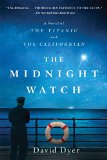Book Club Discussion Questions
In a book club? Subscribe to our Book Club Newsletter and get our best book club books of 2025!
For supplemental discussion material see our Beyond the Book article, Missed Signals and our BookBrowse Review of The Midnight Watch.
Please be aware that this discussion guide will contain spoilers!
- The historical incident that underlies The Midnight Watch seems to have slipped from public memory, even while interest in the Titanic has grown stronger. Why do you think that is?
- The exact reason why the Californian did not respond to the Titanic's rockets can perhaps never be known, but how plausible do you find the answer offered by the novel?
- Discuss the way in which The Midnight Watch brings vividly to life the Boston of Steadman's time. How might you describe the characterization of other cities in the novel (New York, Washington, London, Liverpool)?
- Consider the ways in which The Midnight Watch reflects on technological change: the effect of new technologies on Steadman's job, on daily life, on the maritime industry, and anything else that strikes you.
- Consider Olive's argument about the order of preference for those boarding the Titanic's lifeboats (page 136). Should it still be women and children first in today's world, in your opinion?
- Harriet tells Steadman on page 137, 'This is a new age, Papa, and girls don't always do what their fathers say.' In what ways does the novel challenge and unsettle conventional 1912 notions of manhood and womanhood?
- Compare Mrs Stone and Mrs Lord. What role do these women have in The Midnight Watch?
- Early in the novel, Olive says that Steadman will never, in his writing, be able to show how much she loved her son. 'That was something beyond words.' (page 6) But when she reads 'Eight White Rockets' she thanks him: 'I see what you have done.' (page 252) Do you think that Steadman has, after all, been able to show the power of a mother's love?
- This is a novel that plays poignantly with what-ifs. Discuss those that strike you.
- 'The story of the Californian is a story of heroism. There were brave men on that ship . . .' (page 124) Do you think there were brave men on the Californian?
- As Steadman observes Lord giving evidence at the London inquiry, he finds himself vacillating between wanting the captain to tell the truth and feeling sorry for the man. Do you share these contradictory feelings? Consider Steadman's earlier comment (page 177) that the sea had somehow tricked Lord.
- Discuss the role of Moby-Dick in the novel. What do you think is the significance of Herbert Stone throwing his copy overboard (page 98)?
- Compare the guilt Stone feels for the Titanic's dead with that of Charlie Groves, the third officer, who blames himself for not noticing that the wireless detector had wound down (page 85).
- And compare these two men to Captain Lord, for whom the quality of self-deception, fed by an ironclad self-belief and self-confidence, seems to allow an untroubled conscience.
- How does Stone try to resolve his conflict between loyalty to his captain and loyalty to the truth? To what, if any, degree is he successful?
- What in your opinion represents the greater failing of the two Californian protagonists, not to have acted after seeing the rockets, or not to have admitted the truth?
- . How do you think Steadman sees Lord by the close of the novel? Is he in fact mocking him in the final scene, do you think? What does the end of the novel show us about Steadman himself? How has he changed?
- What's your own view of the moral fibre of Captain Lord and Herbert Stone? Who do you think possesses the stronger character?
Unless otherwise stated, this discussion guide is reprinted with the permission of St. Martin's Griffin.
Any page references refer to a USA edition of the book, usually the trade paperback version, and may vary in other editions.
